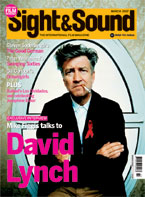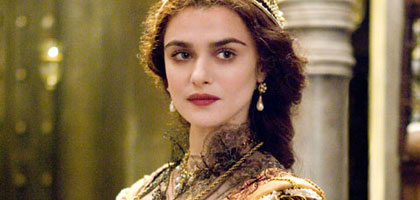Primary navigation

USA 2006

Reviewed by Michael Atkinson
Our synopses give away the plot in full, including surprise twists.
Three separate but related storylines, each in its own distinct time and space, alternate. In the 1500s, during the rise of the Spanish Inquisition's power, a conquistador named Tomas is sent by Queen Isabel to the New World to find the legendary Tree of Life, the sap of which bestows immortality. In the jungles, Tomas fends off mutinous soldiers, bloodthirsty Mayan natives and a torch-bearing high priest, and reaches the sacred pyramid that hides the tree, only to find himself sacrificed to its powers. In a present-day storyline, Tomas' tale provides the autobiographical parable for a novel pen-written by the present-day Izzi, an impulsive, life-loving woman beset by a brain tumour. Izzi's husband Tom is a research scientist experimenting with monkeys and desperately trying to find a cure, not so much for cancer but for death itself. His work becomes centred on a molecular compound retrieved from a rare Guatemalan tree; even with some miraculous success, a cure seems elusive, and Izzi grows sicker. Meanwhile, senior staff at Tom's laboratory warn him about working himself to death, not spending time with his sick wife, and taking too many risky detours around formal procedure. The third plot strand involves another Tom - or possibly the same one - who is bald, levitates during meditation, and lives in a space-travelling bubble along with the Tree, which he talks to and caresses. As the bubble floats to a distant nebula supposedly referenced in Mayan myth, Tom experiences memories of and/or mixed-up time-space with his two alter egos.
Famously plagued by production shutdowns, fleeing producers, a slashed budget and the unceremonious exit of its original stars (Brad Pitt and Cate Blanchett left, apparently in tandem, to star in Babel), The Fountain emerges from its own purple haze as unarguably the wackiest Hollywood movie of 2006. That is, the most unintentionally ridiculous pap. Writer/director Darren Aronofsky reportedly nursed this mutant child for years, and it does in fact evoke the foggy head-space of a teenager dubiously blessed with too much good weed and an unfettered devotion to the books of Carlos Castaneda. It's difficult to recall another American film that, in pursuing a passionate and personal vision, goes so maddeningly, uproariously wrong.
Indeed, the very fact that The Fountain is supposed to be a tearful emotional assault, while at the same time not making a lick of common narrative sense to anyone except Aronofsky, may be part of its allure. In the States, opinion - popular and critical - has been largely divided between those appalled at the movie's dropped stitches and missing parts, and those who gave up caring and instead took on the film-maker's headlong, eternal-love creed. It's difficult to argue with cineastes who swoon over an auteur's crazy romanticism, but it's also tough as nails to buy into a film this ramshackle, over-earnest and childishly pretentious.
To describe Aronofsky's movie in any capacity is to bump into what's essentially amiss - as enjoyable as the company of a tireless peyote-eater, it begins in a high state of self-glorifying cosmic rapture and never stops. The erratic and pointless leapfrogging between its three storylines is torporific, and never disguises the fact that these tales are only nominally connected: a conquistador's odyssey can be dismissed merely as the rather pitiful novel the modern-day, terminally ill Izzi is writing (in decorous calligraphy!), while the contemporary medical narrative is in dire need of dramatic depth and breadth, not nonsensical mysticism. Izzi's research scientist husband Tom, lost in pre-mourning for his sick wife, is seemingly beset by the ultimate case of denial - while it's meant to be undying love that motivates him to break scientific rules, storm angrily around when death is mentioned, and even beat up a doctor who tries to stop him resuscitating Izzi's corpse, it comes off as near-psychotic behaviour.
The 'future' scenes of the third storyline are the most boggling - infused with dripping pink mist and blacklight-poster chintz. We're led to believe that this tale's hairless Tom is in fact the now-immortal scientist Tom, but why he's devoid of hair, why he's in a space bubble, whether or not Izzi has become the tree he kisses in desperate moments, what he expects to find when he reaches the Orion nebula that Aronofsky has equated with the Mayan underworld Xibalba, are all questions left unanswered.
As it is, all three stories are assembled piecemeal, as if out of cutting-room scraps, many of which repeat over and over as flashbacks and flashforwards. Reality, the ground from which these scenarios ostensibly launch, is never an issue; even if you can forgive the fleeting heroism of a Spaniard slaughtering Mayans, it's difficult to swallow the clueless amalgamation of Mayan, Biblical, Buddhist, Taoist and New Age iconography, all of it tossed as if into a stew. (The bald Tom does tai chi against the stars, and floats in a lotus position.) At 37, Aronofsky evinces as much knowledge about death as he has experience with meditation. "Death as an act of creation!" someone burbles midway through, after a Mayan heirophant declares (several times), "Death is the road to awe!" - devotional thoughts that seem to grate against the hacked Mayans, the executed heretics back in Spain, and Izzi's own much-mourned slide into the hereafter.
You can give the movie credit, at least, for having the originality to explicitly stump for pagan regeneration myths over a Christian cosmology. (The film's only villain is Stephen McHattie's self-flagellating Grand Inquisitor, who poses a political threat to Queen Isabel while extolling the virtues of a purging demise.) If Aronofsky's dwindled budget (down to $35 million) shows in some ways (there are many claustrophobic close-ups where there could be sets), long-time associate Matthew Libatique's glowering cinematography makes The Fountain kind to the eyeballs. It's mostly left to the actors to keep this leaky ship from submerging altogether, and both Hugh Jackman and Rachel Weisz, in varying incarnations, work like dray horses to stir up an emotional boil out of virtually nothing. Weisz, as usual, can be particularly affecting with her throaty chortle and umber eyes, but the majority of the labour is Jackman's, mustering dedicated rage, weepy grief and angsty transcendence (one emotion for each time-frame) as if he's mastering a series of acting-class assignments.